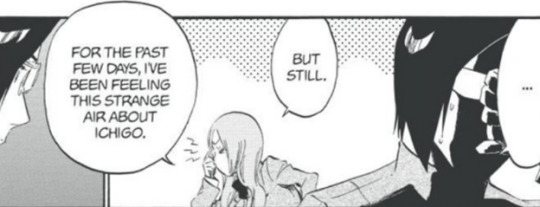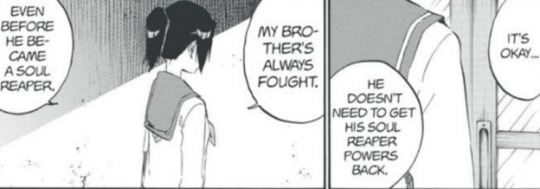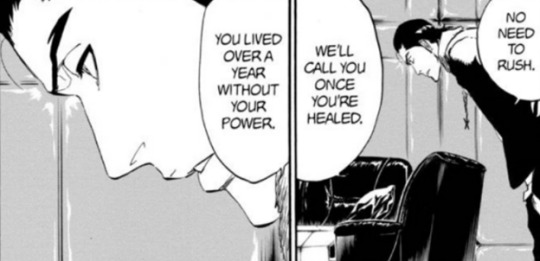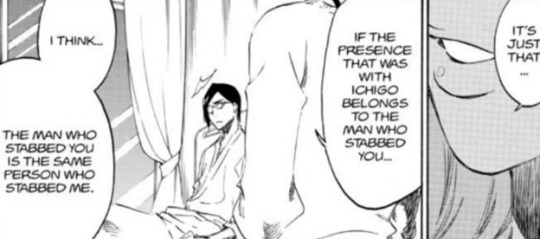#it just really annoys me when an author appropriately limits their ambition and yet still fucks it up
Explore tagged Tumblr posts
Text
The Kids in the Room
The Fullbringer Arc is tighter and more coherent than anything in the manga so far, telling a very straightforward story about a young person’s alienation from the world he lives in. It has very specific things to say about the role of parents, mentors, and friends in the process of a kid becoming an adult and does a pretty decent job of looking at how different organizations (the state, gangs) can play into that young person’s life. And then, at the climax of the story, it very intentionally takes all that hard work, and for what I must assume were business reasons, tosses it all away.

The Arrancar Arc was a glorious, grandiose mess. It featured no fewer than three separate worlds, four distinct factions, and probably around twenty characters with active character arcs. Although it started off with the truly breathtaking ambition of weaving all of this together, by the end Kubo had cut a considerable amount of the subplots in favor of actually getting to the end of the story he was telling. And it still mostly worked! Ichigo’s character arc, at least, ended where I think it was always going to: sacrificing his nigh-unlimited power after understanding the price of that power.

But of course, giving up all of your powers isn’t really a long-term solution for Ichigo, just like it isn’t for any of us in life. Ruling over three worlds might tend to corrupt a person, but we all want—and need—to feel like we have some power over our own lives. Ichigo, in his final year of high school, living on the precipice of adulthood, feels this in more than one way. He had this power. He sacrificed it. And yet now, he’d do anything to get it back. Anything except ask for help.

You see, asking for help is hard, but especially in the context of “seeking power”, which in this story is an even less veiled metaphor for “growing up” than it usually is in shonen manga. Asking for help means admitting both weakness (you don’t have the power to get what you want right now) and discontentment (there is something you want that you don’t have). For Ichigo, whose primary method of coping with his mother’s death was asserting a premature independence, this would be difficult even if the thing he was seeking wasn’t something he had very publicly given up in front of his friends and family. Yes, there are times when he doesn’t want to involve them to protect them, but a big part of his self-imposed isolation is his own ego, his unwillingness to reveal to people who love him just how miserable he is, out of fear that it will reveal him to be somebody they won’t love anymore.

And that’s where the Fullbringers come in. Ginjo puts in a tremendous amount of work into getting close to Ichigo—lying to him, giving him little bits of information piecemeal without telling him the whole thing, and of course, offering him power that Ichigo desperately wants. But none of it would be possible if Ichigo didn’t have this preexisting desire to do it all himself, or at least to appear to his friends and family like he’s doing it himself. Ginjo does what nobody else in Ichigo’s life does—offers him assistance without making him ask for it. Hook, line, sinker.

The body of the arc covers this masterclass in manipulation from Ginjo, and it’s a huge change from what has, up until this point, been a very standard shonen battle manga in terms of content, where the fights happen on a more or less weekly basis. Here, it takes over half the arc for Ichigo to fight anybody! It’s all character development, even for the side characters like Orihime and Chad, who don’t get fights of their own but do get to express themselves and show initiative in ways they were largely denied in the previous arc. It’s all a long, slow burn to the climax, where Tsukishima suddenly strips away the support system that Ichigo had so undervalued, leaving him defenseless against Ginjo’s theft of his power.

And that’s my big frustration with the climax. It’s not that I like the Karakura kids more than I like the Soul Reapers, although I very well might. It’s that so much work has been put into drawing out and developing these relationships, so much effort put into showing how this is affecting all of them. And it’s not just metatextual effort either—yes, we spend a lot of pagetime with Chad and Orihime and Uryu, but Xcution also targets them all because of their importance to Ichigo! The very story itself recognizes that they’re the support system that Ichigo needs to be an emotionally healthy adult! Any logical resolution must therefore involve them!

But it doesn’t. Instead, it’s the Soul Reapers, who have not been physically or even narratively present at all for four volumes, who come in and repower Ichigo. They’re the ones who pair up for the fights against Xcution, fights that are very light on the sort of character work that is so characteristic of Bleach fights because there just isn’t the grounding for it! Even the fights that show character are mostly showing development that seemingly occurred off-panel, leaving you wondering when exactly Toshiro and Ikkaku achieved their newfound maturity. But the supporting characters from the bulk of the arc are written out, and even the personal feelings of Shigekuni Genryusai Yamamoto wind up being more important to the narrative.

This isn’t just unsatisfactory on the level of the supporting characters, it also fatally undercuts Ichigo’s own development. We expect the story to end with him overcoming the challenge set in front of him, which at the beginning is clearly his alienation from the people he loves. But he doesn’t really do that—instead, the Soul Reapers showing up is what solves his problems, which suggests that the actual problem in his life is just “they weren’t around”. I don’t think that’s actually what we’re meant to take away here, and the narrative doesn’t seem to think so either, which is why we end with the character development being passed on to Soul Society instead. They learn something in this arc, which is to trust Ichigo. But he doesn’t seem to have learned a damn thing.

And that’s what frustrates me so much about this arc: the lost potential, the fact that there was a very obvious story being told that was abruptly discarded, right at the moment it mattered most. There was probably no way Kubo could have fulfilled all the potential of the Arrancar Arc: there were just to many characters, too many storylines. But here, he condensed his writing, narrowed his scope, and still told a compelling story up until he suddenly threw it all away. Whatever the reason for it-- and I have no insight into the editing or business pressures that might have motivated a climax so different from that the story was obviously building to-- it’s disappointing.
#Bleach#Troius reads Bleach#I spent the weekend on this lol#hope y'all are in the mood for 1200 words of my complaints about this arc#it just really annoys me when an author appropriately limits their ambition and yet still fucks it up#anyhow I'll have more positive content out this week#my six hearts vs Xcution matchups#but I wanted to get this out first so you knew where I was coming from#wrap up post
68 notes
·
View notes
Text
Personal Recommendation (3/28/21)

The Winter Duke by Claire Eliza Bartlett
Why am I recommending this book?
I stayed up until 1:00 am to finish this book. I thought it was really good, and I think it avoided some of the pitfalls of YA very well.
Want something quick and short? Check out my tiktok
Plot 1 2 3 4 5 6 7 8 9 10
Ekata Avenko is ready to leave her ducal family behind for the comforts of university in the south. Not only are they haughty and affection-less, but they have a habit of trying to off each other so there’s less competition for succession. Unfortunately, just after her oldest brother’s brideshow, the day before Ekata is finally free, her entire family falls into deep sleep, and Ekata is the only one left to rule Kylma Above. Besides regular politics, Ekata also has to deal with her power-hungry foster brother, relations with the magic-producing Kylma Below, and discovering who put her family to sleep–and how to wake them up.
I loved the plot. I love stories that focus on the intricacies of politics, how trade agreements and social functions are just as important as the armies a country has. I also think The Winter Duke had some rather realistic political exchanges, including how Ekata was utterly hopeless at them. Her attempts to mold herself into the perfect politician were convincing and interesting, with real consequences. Also, it was interesting to see the various opinions presented by many different people, and yet none of those people were wholly good or bad. I also loved the idea of Kylma Above and Kylma Below. One kingdom has unlimited magic but no contact with the rest of the world with the other offers contact in exchange for refined magic. It also provided a reason for why the antagonists kept Ekata alive when they could just have planned a coup.
Bartlett did a very good job of surprising the reader. As I read the book, I suspected exactly who it was, but that was because I was suspecting everyone. I knew there would be a betrayal, but I had absolutely no idea who it would be. And it made sense! Looking back at what was written, I asked myself why I didn’t think of it before. In a world where “surprising the audience” increasingly means “doing something completely unreasonable and never hinting at it in the narrative”, it really was a breath of fresh air.
Characters 1 2 3 4 5 6 7 8 9 10
Ekata is so relatable. All she wants to do is pursue her passions and leave complicated politics and even talking to people behind her. She had absolutely none of the answers, but she was willing to work to find them. She was beautifully flawed, but in a way that didn’t make me hate her. Even when I knew she was doing the wrong thing I was rooting for her. Her struggles to protect her family and the duchy were both compelling and admirable. Also, her relationship with Inkar was so lovely.
Inkar, Ekata’s emergency political bride, was great. She’s everything Ekata wishes to be, but she still loves and supports her. I honestly don’t think Ekata could’ve found a better match. Also, I loved that even though Ekata was supposed to be making her feel uncomfortable, her and Inkar couldn’t help but bond over shared opinions and experiences.
Sigis. Ugh. He’s so horribly slimy and creepy. He was the perfect antagonist. I loved to hate him. His ambitions and conflict with Ekata also drove the story forward perfectly. Also needing to be mentioned is Eirhan, who was wonderfully annoying. As prime minister, he was Ekata’s closest advisor, and the whole book is spent wondering if he’s just trying to solidify his political position or if he’s after something more. Finally, Aino was so sweet, and her and Inkar’s rivalry, which resembled a subtle girlfriend vs. mother-in-law trope, added some conflict as well. The way her character arc ends was surprising, yet satisfying.
Special mention to the ministers for making Ekata’s life as hard as possible.
Writing Style 1 2 3 4 5 6 7 8 9 10
Ekata has a very distinctive voice. She’s a bit odd, a combination of period-appropriate vocabulary and modern tone. Her frustration and hatred really come bleeding off the page. Unfortunately, when it comes to love or passion, it isn’t as vibrant. Of course, that may be due to the abundance of the former and lack of the latter in her life, but I do wish I could feel more about positive things in her life. One thing I really liked was the nonchalant attitude about gender and sexuality. Ekata is attracted to girls, she knows that. No one protests to her and Inkar’s marriage because they’re the same gender (though they do have things to say about it politically), and one of the ministers had they/them pronouns that were never discussed. After all, why should a fantasy world have the societal limitations of ours? (Still, points off for not having a map, because I wish there’d been a layout of Kylma Above with a corresponding map of Kylma Below.)
Overall 1 2 3 4 5 6 7 8 9 10
In case you couldn’t tell by my gushing, I really liked The Winter Duke. I think it avoided some of the more typical YA tropes such as love triangles, main characters with special powers, and a lovely solution to everything. The plot kept me engaged, I love reading from Ekata’s perspective, and it had a perfect twist at the end. I would recommend this book to people who like politics, intricate magic systems, and lesbians.
The Author
Claire Eliza Bartlett: Born in the US, lives in Denmark, also wrote We Rule the Night and The Good Girls
The Reviewer
My name is Wonderose; I try to post a review every two weeks, and I take recommendations. Check out my about me post for more!
5 notes
·
View notes